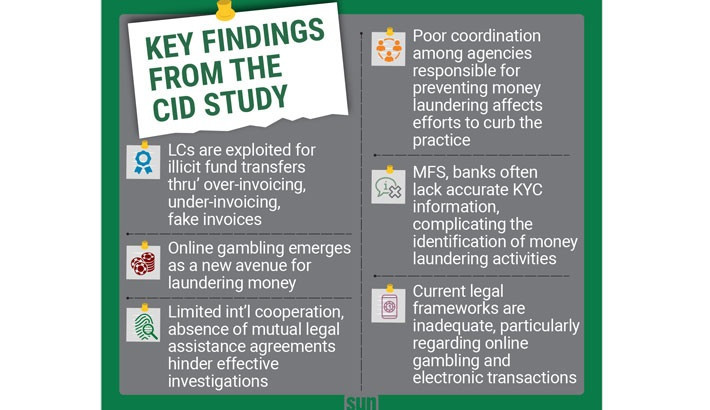Mahabub Alam
Published:2024-07-01 13:26:43 BdST
Trade being used as channel to launder money: CID study
A new study by the Criminal Investigation Department (CID) of police has exposed a concerning phenomenon in the country’s financial system: trade-based money laundering.
According to the study report unveiled on Sunday, transactions through letters of credits (LCs) are being used as a major channel to move illicit funds across borders.
Traders manipulate invoices taking advantage of loopholes in the LC system. They sometimes inflate import costs through over-invoicing, under-report export earnings through under-invoicing and make fake invoices to launder money.
Besides, online gambling has emerged as a new avenue for money laundering.
The study revealed that money laundering and online gambling have grown to be major social problems in recent years, endangering both public safety and economic stability.
Criminals may attempt to exploit online gambling platforms to launder their illicit funds by using them as intermediaries to obscure the source of the money.
However, a lack of mutual legal assistance with other countries, actual information about the import-export process, coordination among the seven agencies tasked with preventing money laundering and KYC (Know Your Customer) details from banks and Mobile Financial Services (MFS) providers is hindering efforts to curb money laundering, the CID report says.
While speaking at the report launching ceremony at the CID headquarters, its chief Mohammad Ali Mia, also an additional IGP, said there is no data on how much money is being laundered through online gambling and MFS providers.
The MFS providers should be brought under the law in case of money laundering using mobile financial windows, he said.
The CID chief said the Cyber Security Act had a section under which cases could be filed for money transactions through electronic devices and other offences as it was cognisable.
But the section has now been made non-cognisable for which cases cannot be filed over online gambling, he said, adding that an online gambling-related law is an urgent need, especially to curb money laundering through gambling.
Another medium of money laundering is e-commerce, payment gateways or e-wallets.
The actual and detailed information is not available with the CID about the people or organisations who are conducting such business, which causes delays in search and investigation work.
Investigation officers face several challenges during the investigation into money laundering complaints for various reasons, says the study report.
Due to the lack of mutual legal assistance (MLA) agreements with other countries regarding money laundering, there is a delay in getting the necessary information.
Even though there are bilateral agreements with some countries, investigation does not bring expected results due to the lack of a clear framework on money laundering.
Even if the money is laundered through MFS providers, they cannot provide the correct information on the senders and recipients.
Similarly, no bank can provide any information about the KYC of the sender or receiver in such transactions.
Again, some private institutions are reluctant to provide the necessary information without the court order, which hinders the progress of ongoing inquiry and investigation work.
As the CID has no jurisdiction over daily transaction records (Dashboard) of money laundered through stock market regulation, it is not possible to identify suspicious transactions immediately, the study report states.
According to the Money Laundering Prevention Act-2012 and Money Laundering Prevention Rules-2019, seven agencies are responsible for checking money laundering and regular communication, interaction and exchange of information between the agencies is essential but it is not observed to a large extent.
The agencies are Bangladesh Financial Intelligence Unit, CID), Anti-Corruption Commission (ACC), Department of Narcotics Control (DNC), National Board of Revenue (NBR), Directorate of Environment and Bangladesh Securities and Exchange Commission (BSEC).
Research and training specialist Prof Dr Khan Sarfaraz Ali, also a training adviser to the CID, said apart from these agencies, city corporations, Joint Stocks Company, Department of Immigration and Passports, Bangladesh Telecommunication Regulatory Commission (BTRC) and NID Wing have responsibilities to combat money laundering.
A set of recommendations has also been put forward in the study report. These include ensuring CID’s direct access to import-export data and MFS-bank transaction information to facilitate investigations, strengthening KYC procedures and requiring financial institutions to quickly report suspicious transactions, implementing stricter monitoring of indirect institutions involved in MFS transactions, introducing biometric verification for cash withdrawals to enhance traceability, setting up a robust legal framework to regulate and combat online gambling, maintaining better communication and information sharing between law enforcement agencies and regulatory bodies and making BTRC more diligent in blocking gambling apps and sites.
Unauthorized use or reproduction of The Finance Today content for commercial purposes is strictly prohibited.


